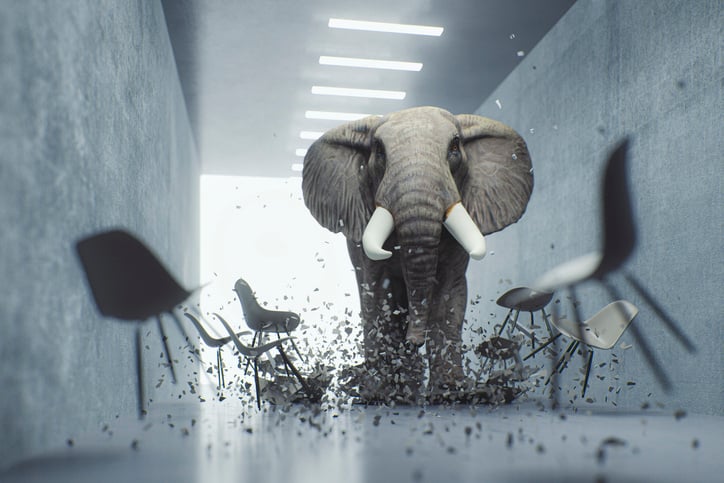This powerful phrase credited to Phil Condit reflects a mindset every scaling team and organization who is playing to win must manifest. Your challenge - should you choose to accept it is to get your team "idea rich" on a continuous basis. No one of us has all the answers.
Are you building a winning machine that is built for speed or are you building an echo chamber filled with yes people?
Choose carefully. Your legacy awaits.

Building a Culture of Diverse Thought is Your Key To Scaling
In today’s competitive business landscape, building a culture of diverse thought is not merely a suggestion; it is a fundamental requirement to winning. Leaders who fail to recognize the profound value of diversity in thought condemn their organizations to stagnation and, ultimately, decline. This is not a matter of preference or convenience—it is a critical decision that separates those who will lead their teams to victory from those who will drift into mediocrity.
And history is filled with role models...
Abraham Lincoln's Cabinet of Rivals
Consider the example set by Abraham Lincoln, a leader who understood the necessity of surrounding himself with a cabinet of rivals—experts who did not merely echo his ideas but challenged him, forcing him to refine his strategies and strengthen his resolve. Lincoln’s brilliance was not solely in his own intellect but in his ability to harness the diverse perspectives of those around him, leading to some of the most critical decisions in American history.

McKinsey & Company's Obligation to Dissent
In a similar vein, McKinsey & Company has long emphasized the obligation to dissent as a central tenet of their business philosophy. This is not a passive allowance for disagreement but a mandated responsibility—each team member is required to challenge ideas and assumptions actively. This approach ensures that the best ideas are refined through rigorous debate, leading to superior outcomes and sustained success. The message is clear: dissent is not just tolerated; it is expected.
Amazon's Leadership Principles
Amazon’s Leadership Principles echo this sentiment, urging leaders to “seek diverse perspectives and work to disconfirm their beliefs.” This is not a call for comfort or consensus but a directive to engage with opposing viewpoints actively. Leaders are expected to seek out and embrace the discomfort of having their ideas challenged, recognizing that this is the only path to true innovation and growth. The principle is simple: without diverse thought, there can be no progress.
Ray Dalio's Philosophy of Idea Meritocracy
Ray Dalio, founder of Bridgewater Associates, takes this concept even further with his philosophy of an idea meritocracy—a system where the best ideas win, regardless of who proposes them. In an idea meritocracy, decisions are not made based on hierarchy nor title but on the strength and merit of the idea itself. Dalio’s approach is rooted in the belief that the best outcomes arise when everyone’s thoughts are considered, scrutinized, and challenged. It is a culture where truth-seeking prevails, and where leaders must have the humility to accept that their ideas are not always the best—where they must be willing to be proven wrong.
Patrick Lencioni's Five Dysfunctions of a Team Model
This approach aligns closely with Patrick Lencioni's Five Dysfunctions of a Team model, particularly the concept of productive ideological debate. Lencioni emphasizes that the absence of conflict—particularly ideological conflict—within a team is not a sign of health but of dysfunction. For teams to reach the best decisions, they must engage in robust, passionate debate, where all ideas are put on the table, scrutinized, and vetted. This kind of debate is not about personal attacks or undermining others but about challenging ideas to ensure the best ones emerge. It is about commitment—when everyone’s ideas are heard and considered, team members are more likely to commit to the final decision, even if it is not their own. And if you seek to help your team overcome The Five Dysfunctions of a Team, consider our powerful workshop.

Are You Building an Idea Meritocracy Machine Built for Speed or an Echo Chamber?
High performers HATE echo chambers. Long ago, in the late 90's I had a boss who loved to hear himself speak. He built himself an echo chamber and filled it with yes people. Others jokingly called it, his "harem".
True high performers expect to work in a world where they are pushed and they expect fairness of thought and outcome. They expect an idea meritocracy. The fastest way to drive your best ideas out the door to a competitor is to build an echo chamber where the who matters more than the what.
I found myself and a colleague heading for the door very quickly.
Second Place is the First Loser
Enzo Ferrari was absolutely correct. Second place IS the first loser. Decide intentionally.
Entrepreneurs, business owners, and leaders stand at a critical crossroads. The choice they face is stark: build a culture that embraces and nurtures diverse perspectives, or allow the insidious growth of a culture of validation—a culture of “yes people” who prioritize comfort over challenge, agreement over innovation. The consequences of choosing the latter are dire—a slow, inevitable slide into mediocrity, where decisions are made not based on merit or insight but on the desire to avoid conflict.
You are building either an echo chamber or an idea meritocracy machine. One wins. The other is mired in mediocrity. - Chris Young

Take Bold, Decisive Action
This is not a decision that can be delayed or avoided. The urgency is now. The path to success demands bold, decisive action—an intentional choice to shape a culture where diverse thought, productive debate, and the merit of ideas are not just encouraged but are the bedrock of every decision. There is no room for softness or indecision. Leaders must decide, act, and commit to fostering an environment where challenging the status quo is not just accepted but is expected. Failure to do so will lead not to greatness but to a gradual, inescapable decline. The choice is clear: choose a path of intentional victory or succumb to the certainty of mediocrity.
Decide carefully and decide now. Your trajectory depends on it.
Chris Young is a Trusted Advisor To Founders / CEOs | Certified Scaling Up Coach | Builder of People, Leaders, Teams & Economic Moats | Strategist and proud founder of The Rainmaker Group.




